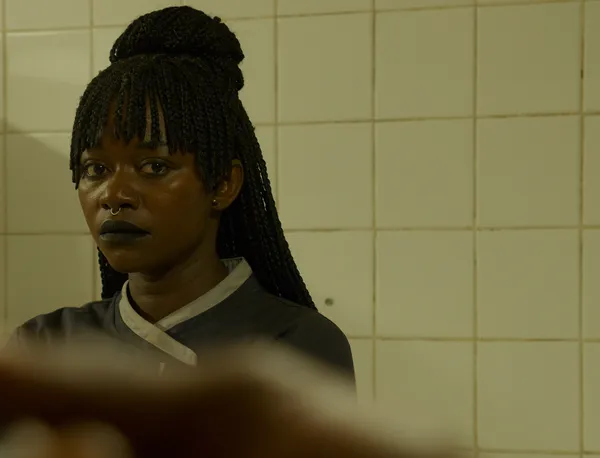Eye For Film >> Movies >> Our Father, The Devil (2021) Film Review
Our Father, The Devil
Reviewed by: Jennie Kermode

Like many refugees who have made their home in Europe, Marie (Babetida Sadjo) works in a care home. She provides some direct support for the residents – notably Jeanne (Martine Amisse), her former tutor, who remains a friend – but her primary role is as a chef. It’s a function around which her whole life revolves, a way of being useful and of setting aside the personal. In the opening scene of Ellie Foumbi’s film, before the credits appear, we see her in a montage of shots: her back, her hair, her body below the neck. Only later do we see her face, the person – the survivor – ill at ease in this frame.
There’s a belief which much of society still persists in holding onto, that when a person has survived trauma and no longer faces that threat, they are able to live just like anyone else. Marie is far away from war now, yet by that same token, she is far away from anyone who might understand what she went through. Her colleagues no longer see her have panic attacks, but she hasn’t recovered, she’s just succeeded in burying what she cannot bear to think about. When she hears a certain voice issuing from the day room of the care home, all that effort is undone, and she faints dead away.

Is it the voice she thinks it is? For Marie, the stakes are so high that she cannot risk waiting to find out, and takes drastic action. What follows is more complicated. The man, Father Patrick (Souleymane Sy Savane), insists that she has misidentified him – that he’s simply a priest trying to do God’s work. The newspapers say that the young warlord who killed her family is dead – but death is not difficult to fake in war. Can she rely on her memory? Calling that into question is traumatic in itself. She has nothing but memory. If she cannot trust herself, what else is there to cling to?
At this stage, viewers may be reminded of Roman Polanski’s Death And The Maiden, but Foumbi goes a step further as it emerges that Marie herself did not emerge from the conflict with a clear conscience. Forced to become a child soldier, she carries an awful burden of guilt which she has never dared to share. It colours every aspect of her life. She makes herself deliberately unpleasant when friends get too close. She’s a good looking, confident woman, and men are attracted to her, but she doesn’t consider herself worthy of love. When she becomes distracted at work due to her dealings with Father Patrick, Jeanne smiles at her and says “I prayed for this – that you would find someone worthy of you.”
The matter of Father Patrick’s guilt or innocence is only part of what’s at stake here. If he is who she thinks he is, and has genuinely sought to atone, is he less deserving of forgiveness than she is? Where should such lines be drawn? For all we know, the warlord was a child too when his career of violence began. Can she ever forgive herself, or find a way to live beyond cycles of violence? Little details of day to day life, the casual racism encountered in French society, further erode her efforts to find a sense of balance. These petty cruelties, the inclination to exclude, seem more, not less ugly in light of what she has been through. It’s not that people know – it’s that they don’t even try to imagine why people become displaced.
After that dramatic start, Foumbi lets the film build slowly, and the tension mounts as, whatever the realities of her situation, Marie seems to have less and less hope of finding a way out. Sadjo is extraordinary. Though the fact that the film is in French means she’s unlikely to get the level of international notice that she deserves, this is quite simply the best performance of the year, blowing everything else out of the water. It’s devastating to watch, and it speaks, of course, for many real people with no voice. If there is any justice in the world, it will make Sadjo a star.
Foumbi, who wrote as well as directing, shows a constant willingness to break with formula, making the imaginative effort which seems impossible for her characters, all the way to the powerful final scene. It’s hard to believe that this is her feature début (though she has considerable experience directing shorts, and as an actor). It’s an assured piece of work with a clear vision, and it will leave you eager to see what she does next.
Awards season is often a long, hard slog for critics. I watched over 250 films in the past two months. This one made the effort worthwhile.
Reviewed on: 15 Jan 2023















